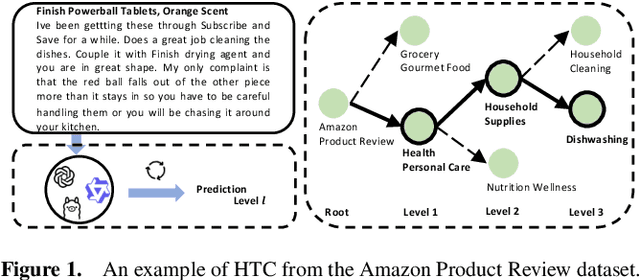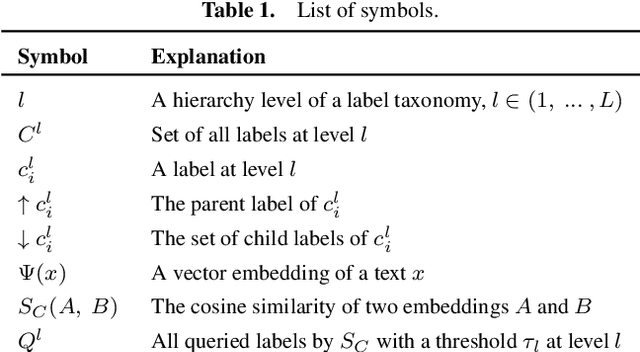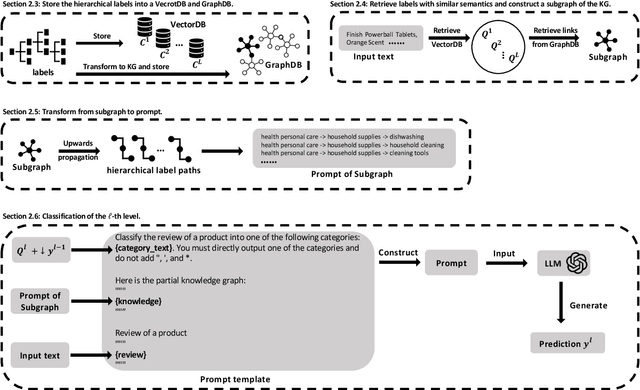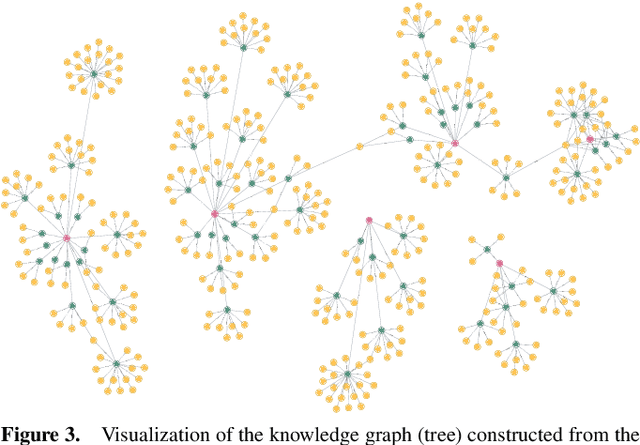Johannes Sedlmeir
FINATRAX - Digital Financial Services and Cross-Organisational Digital Transformations
KG-HTC: Integrating Knowledge Graphs into LLMs for Effective Zero-shot Hierarchical Text Classification
May 08, 2025



Abstract:Hierarchical Text Classification (HTC) involves assigning documents to labels organized within a taxonomy. Most previous research on HTC has focused on supervised methods. However, in real-world scenarios, employing supervised HTC can be challenging due to a lack of annotated data. Moreover, HTC often faces issues with large label spaces and long-tail distributions. In this work, we present Knowledge Graphs for zero-shot Hierarchical Text Classification (KG-HTC), which aims to address these challenges of HTC in applications by integrating knowledge graphs with Large Language Models (LLMs) to provide structured semantic context during classification. Our method retrieves relevant subgraphs from knowledge graphs related to the input text using a Retrieval-Augmented Generation (RAG) approach. Our KG-HTC can enhance LLMs to understand label semantics at various hierarchy levels. We evaluate KG-HTC on three open-source HTC datasets: WoS, DBpedia, and Amazon. Our experimental results show that KG-HTC significantly outperforms three baselines in the strict zero-shot setting, particularly achieving substantial improvements at deeper levels of the hierarchy. This evaluation demonstrates the effectiveness of incorporating structured knowledge into LLMs to address HTC's challenges in large label spaces and long-tailed label distributions. Our code is available at: https://github.com/QianboZang/KG-HTC.
Trustful Coopetitive Infrastructures for the New Space Exploration Era
Feb 08, 2024



Abstract:In the new space economy, space agencies, large enterprises, and start-ups aim to launch space multi-robot systems (MRS) for various in-situ resource utilization (ISRU) purposes, such as mapping, soil evaluation, and utility provisioning. However, these stakeholders' competing economic interests may hinder effective collaboration on a centralized digital platform. To address this issue, neutral and transparent infrastructures could facilitate coordination and value exchange among heterogeneous space MRS. While related work has expressed legitimate concerns about the technical challenges associated with blockchain use in space, we argue that weighing its potential economic benefits against its drawbacks is necessary. This paper presents a novel architectural framework and a comprehensive set of requirements for integrating blockchain technology in MRS, aiming to enhance coordination and data integrity in space exploration missions. We explored distributed ledger technology (DLT) to design a non-proprietary architecture for heterogeneous MRS and validated the prototype in a simulated lunar environment. The analyses of our implementation suggest global ISRU efficiency improvements for map exploration, compared to a corresponding group of individually acting robots, and that fostering a coopetitive environment may provide additional revenue opportunities for stakeholders.
Designing Trustful Cooperation Ecosystems is Key to the New Space Exploration Era
Feb 08, 2024

Abstract:In the emerging space economy, autonomous robotic missions with specialized goals such as mapping and mining are gaining traction, with agencies and enterprises increasingly investing resources. Multirobot systems (MRS) research has provided many approaches to establish control and communication layers to facilitate collaboration from a technical perspective, such as granting more autonomy to heterogeneous robotic groups through auction-based interactions in mesh networks. However, stakeholders' competing economic interests often prevent them from cooperating within a proprietary ecosystem. Related work suggests that distributed ledger technology (DLT) might serve as a mechanism for enterprises to coordinate workflows and trade services to explore space resources through a transparent, reliable, non-proprietary digital platform. We challenge this perspective by pointing to the core technical weaknesses of blockchains, in particular, increased energy consumption, low throughput, and full transparency through redundancy. Our objective is to advance the discussion in a direction where the benefits of DLT from an economic perspective are weighted against the drawbacks from a technical perspective. We finally present a possible DLT-driven heterogeneous MRS for map exploration to study the opportunities for economic collaboration and competitiveness.
Fairness, Integrity, and Privacy in a Scalable Blockchain-based Federated Learning System
Nov 11, 2021



Abstract:Federated machine learning (FL) allows to collectively train models on sensitive data as only the clients' models and not their training data need to be shared. However, despite the attention that research on FL has drawn, the concept still lacks broad adoption in practice. One of the key reasons is the great challenge to implement FL systems that simultaneously achieve fairness, integrity, and privacy preservation for all participating clients. To contribute to solving this issue, our paper suggests a FL system that incorporates blockchain technology, local differential privacy, and zero-knowledge proofs. Our implementation of a proof-of-concept with multiple linear regression illustrates that these state-of-the-art technologies can be combined to a FL system that aligns economic incentives, trust, and confidentiality requirements in a scalable and transparent system.
 Add to Chrome
Add to Chrome Add to Firefox
Add to Firefox Add to Edge
Add to Edge